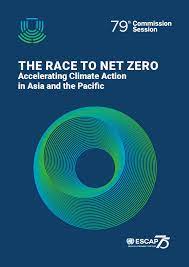The Race To Net Zero: Accelerating Climate Action In Asia and the Pacific

Recent study, “The Race to Net Zero: Accelerating Climate Action in Asia and the Pacific,” by the United Nations Economic and Social Commission for Asia and the Pacific (UNESCAP) has revealed that most countries in Asia and the Pacific are inadequately equipped to manage the growing threats posed by extreme weather events and natural disasters.
- The study emphasizes the lack of necessary data and resources to support adaptation and mitigation efforts in the region.
Key Highlights:
- Increasing temperatures in the region over the past 60 years have surpassed the global average, leading to more frequent and intense extreme weather events and natural hazards.
- Tropical cyclones, heatwaves, floods, and droughts have resulted in significant loss of life, displacement, health issues, and heightened poverty levels.
- Out of the top 10 countries most affected by such disasters, six are located in the Asia-Pacific region, causing disruptions in food systems, damaging economies, and undermining societies.
- Climate change and climate-induced disasters disproportionately burden marginalized and vulnerable groups, including women, children, the elderly, persons with disabilities, migrants, indigenous populations, and young people in vulnerable situations.
- The Asia-Pacific region is responsible for more than half of the world’s greenhouse gas emissions.
- Rapid development, coupled with a significant population, places the region at a critical position in the global climate crisis.
- Many low-lying cities and vulnerable small island states are located within the region, exacerbating the risks faced by these areas.
- Economic Costs of Climate Change estimates the annual average losses from natural and biological hazards in Asia and the Pacific to be around 780 billion USD.
- These losses are projected to increase to 1.1 trillion USD under a moderate climate change scenario and 1.4 trillion USD under the worst-case scenario.
- Current financing for climate action falls short of meeting the region’s needs and limiting global warming to 1.5°C.




